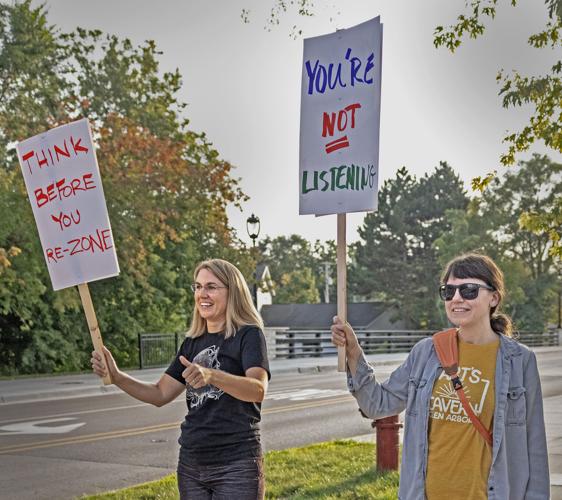TRAVERSE CITY — Time is running out if Traverse City commissioners are going to consider proposed zoning changes to one- and two-family neighborhoods before an upcoming election.
Mayor Richard Lewis told commissioners at their study session Monday that they have until their Oct. 16 meeting to either vote on some or all of the proposals, or leave them be. Pushing them off to the next city commission, of which he won’t be a part, wouldn’t be fair unless that commission opts to take them up.
“We can either take all of them or part of them or none of them,” he said. “If the answer is no, if we do not wish to proceed, they do not go back to the planning commission nor do we refer them to the next city commission. The amendments die unless — unless — the next city commission wishes to take it.”
During more than an hour of public comment, numerous residents said they want their city leaders to take a closer look at these amendments and consider them one at a time, if at all.
City and Planning Commissioner Linda Koebert said she was concerned about how to move forward, telling an anecdote about cockroaches. Seeing one when she lived in Texas was terrifying to her and, when she told her friends, they all had their own horror stories.
That’s what Koebert believes happened to discussion about the proposed changes: fear ruled the day and the stories people told about them became distorted.
“So I’m nervous about being able to move forward in an informed way, not just based on heat and emotion,” she said.
City resident Chuck Mueller built off that anecdote with one of his own about a Madagascar cockroach shown at a class about insects. Kids grew to like it and even pet it. His point was that education is important, and he implored city commissioners to take time educating residents more about the proposals to clear up any misconceptions.
At issue are a set of six amendments aimed at allowing for more “missing middle” housing, city Planner Shawn Winter said. That includes duplexes, homes with accessory dwellings on site, triplexes and quadplexes — something between single-family homes and high-density apartment buildings.
One amendment would remove the 15-per-year cap on new accessory dwellings and eliminate the requirement that the homeowner live in either the accessory or principal dwelling. It would also allow Accessory Dwelling Units (ADUs) on lots with duplexes in one-family neighborhoods.
Winter said removing the homeowner-occupancy requirement would align this type of housing with every other housing type in the city that doesn’t require owner occupancy.
Koebert said she understood the logic, but believes that aspect should be set aside so commissioners can focus on changes where there’s more consensus, to which other commissioners agreed.
Winter showed survey results, albeit with a small sample size, showing support for other proposed changes. These include: shrinking lot minimum sizes, allowing two residences on oversized one-family lots where dimensions permit, and eliminating the need to split that lot if another property line would create unbuildable conditions.
The amendments would also permit up to four dwellings between two structures on two-family lots, make it easier to split a house into a duplex and shrink the acreage requirement for cluster housing where several houses are built on one oversize lot to one acre from five.
City residents who opposed the amendments implored commissioners to avoid what they feared would be widespread changes to city neighborhoods – from loss of green spaces to poorer quality of life to more strain on already faltering infrastructure.
Caroline Kennedy said the sewer lines in her neighborhood have water infiltration and that she and her neighbors fear flushing their toilets in the winter.
“It’s hard to have your neighbors have a bigger heart about who should be moving in and things like that when your own facilities aren’t working properly,” she said.
Most commenters criticized the proposals while a few supported them, including Planning Commissioner Anna Dituri who pointed to their potential to create housing for young professionals.
Winter reiterated a point about the limiting factors that are likely to keep whatever changes the amendments would permit small and gradual.
Among them is cost, something city resident and real estate agent Sam Flamont said would make it “prohibitive” to buy most homes, demolish them and build duplexes. But there are lots that could be split, and those opportunities shouldn’t be passed up, he said.
Commissioners will revisit the zoning amendments at their Sept. 5 meeting where they’ll decide which parts, if any, to introduce at their Sept. 18 meeting. From there, they could set up an Oct. 16 vote.
A few commissioners spoke of looking to the future, with Koebert telling the audience that the plans city leaders make have to be for the next generation.
Commissioner Mi Stanley stressed that she was born and raised in Traverse City and has no interest in destroying its neighborhoods, nor do any other commissioners.
“I promise you everyone sitting up here this evening wants to do what’s right for the community and do what’s best, not just for the people who live here, but for people who are desperate to return to be near their families,” she said.























